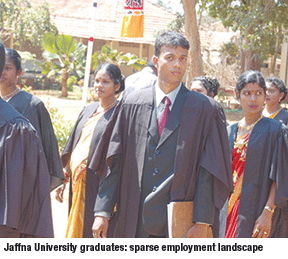 UNIVERSITY GRADUATES IN NORTHERN Sri Lanka, which is recovering from decades of civil war, are looking at a sparse employment landscape with few opportunities on offer. “Those from the north face a much more difficult time than those from elsewhere in the country. New jobs are very difficult to find,” Rupavathi Keetheswaran, government agent for the northern Kilinochchi district and the top public official in the area, told IRIN.
UNIVERSITY GRADUATES IN NORTHERN Sri Lanka, which is recovering from decades of civil war, are looking at a sparse employment landscape with few opportunities on offer. “Those from the north face a much more difficult time than those from elsewhere in the country. New jobs are very difficult to find,” Rupavathi Keetheswaran, government agent for the northern Kilinochchi district and the top public official in the area, told IRIN.
The Sri Lankan census and statistics department notes that national unemployment among graduates stood at 10 percent in 2013, but education officials put the figure in the north significantly higher. The island nation has a population of 20 million. “We don’t have the data, but given the number of inquiries we get from unemployed graduates, it’s much higher,” says Sivalingam Sathyaseelan, secretary of the ministry of education’s Northern Provincial Council.
The primary reasons are an acute lack of jobs in the region, as well as a lack of English language and information technology (IT) skills that are in demand in the private sector. The Central government promised it would create more job opportunities in the north after the nation’s protracted civil war ended in May 2009 and its forces declared victory over the Liberation Tigers of Tamil Eelam (LTTE), who had been fighting for an independent Tamil homeland in northern Sri Lanka since 1983.
The current unemployment figure for the country stands at 4 percent, according to official statistics. In the Northern Province there are no official figures for three of the five districts — Jaffna, Mullaithivu and Vavuniya — that make up the province. In the two districts for which data is available, unemployment is twice the national average, at 8.1 percent in Mannar district and 9.3 percent in Kilinochchi.
High unemployment is in direct contrast to the excellent performance of students from the north in university entrance exams of 2013. Students from the Northern Province recorded the highest national pass percentage in the island-wide university entrance exams, results of which were released in December.
(Excerpted and adapted from www.irinnews.org)



























